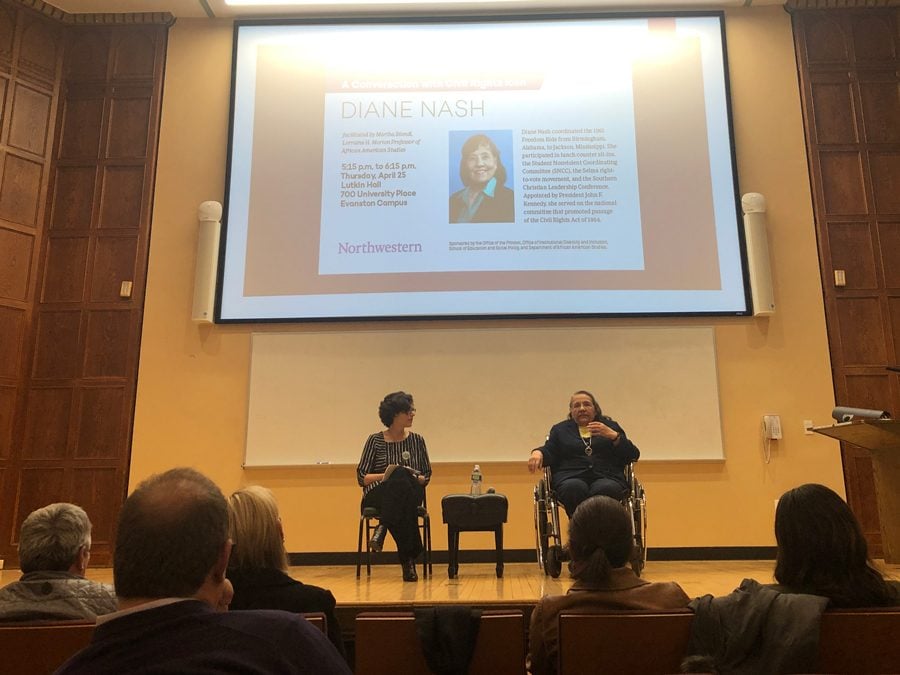Civil rights trailblazer Diane Nash recounts experience as organizer, emphasizes importance of activism
Pranav Baskar/The Daily Northwestern
Civil rights activist Diane Nash speaks with Weinberg Prof. Martha Biondi at a Thursday event hosted at Lutkin hall. Nash recounted her experiences as an activist and emphasized the need for civic activism.
April 25, 2019
To civil rights luminary Diane Nash, there’s no fundamental difference between being an activist and being a citizen: They’re one and the same. In an age when democracy continues to backslide, it’s every person’s obligation to push for progress, Nash told a crowd of roughly 40 Northwestern community members at a Thursday event.
In a conversation with African American Studies Prof. Martha Biondi held in Lutkin Hall, Nash recounted her experiences as a civil rights trailblazer, emphasizing the enduring need for civic action.
Biondi began the talk by outlining Nash’s central role in the civil rights movement. Nash was responsible for coordinating the Freedom Ride from Birmingham, Alabama to Jackson, Mississippi; leading lunch counter sit-ins; and contributing widely to the Student Nonviolent Coordinating Committee.
“She brings meaning to the word ‘freedom fighter,’” Biondi said. “Her tireless efforts transformed this country.”
Nash said she was politicized at an early age — as early as three years old, she watched the news with her grandmother. Growing up, Nash said she rushed to finish her chores so she could watch the Democratic and Republican presidential debates undisturbed.
That social consciousness followed Nash to college in Tennessee where she quickly discovered ways to immerse herself in desegregation initiatives.
“We were the group that led sit-ins,” Nash said. “We worked on consensus. If there was an issue, we’d take a straw vote…and if the margin of support wasn’t strong enough, we’d keep
talking. We felt like we needed the whole-hearted support of everyone.”
Nash said she organized a march to the city courthouse, where she asked the mayor directly whether he supported discrimination solely on the basis of race.
“At first he talked around the question,” Nash said. “But I had studied syllogism, so I got him to answer.”
Soon after Nash’s efforts, Nashville became the first city in the United States to desegregate lunch counters, Biondi said, which set an example for a movement that would soon cross state borders. That campaign became institutionalized through the creation of SNCC, a coalition of students across the South dedicated to fighting Jim Crow.
While Nash was initially reluctant to join SNCC as an elected, vocal member, she came around to the idea. She said she thought it was important to create a central network to help spread information and coordinate activism.
Weinberg junior Alisa Liu, who attended the event, said she loved Nash’s demeanor throughout the conversation.
“It was incredible,” Liu said. “It’s just so insane she lived through all of those events, and I think what was more shocking to me was that the talk wasn’t heavy at all. It didn’t have a feeling of hopelessness or anything — she was incredibly positive.”
That’s not to say that Nash didn’t encounter hardship — quite the contrary. In her time organizing, Nash was imprisoned multiple times, once while she was still pregnant with her first child. She still has vivid memories of the fear she experienced when approaching mobs or police forces while marching. But each time that anxiety set in, Nash had a response.
“We told ourselves, ‘The work we’re doing is important. We have to act for the people who will follow us,’” Nash said. “Even though we hadn’t met you, we loved you. Future generations, it’s up to you to do the same.”
Email: pranavbaskar2022@u.northwestern.edu
Twitter: @pranav_baskar



